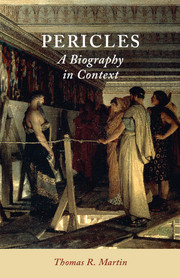Book contents
- Frontmatter
- Dedication
- Epigraph
- Contents
- List of Illustrations
- List of Maps
- Acknowledgments
- Chronology
- Pericles' Alcmeonid Family Tree
- Introduction: A Biography of Pericles in the Context of the Ancient Sources
- 1 The Notorious Family History of Pericles' Mother
- 2 The Harsh Lessons of the Career of Pericles' Father
- 3 Pericles Becomes a Teenager during a Family Crisis and a National Emergency
- 4 Pericles Becomes a Refugee during Athens' Greatest Peril
- 5 Pericles Becomes an Adult as Athens Builds an Empire
- 6 Pericles' Innovative Education for Leadership in Athenian Democracy
- 7 Pericles Becomes a Leader as Athens and Sparta Become Enemies
- 8 Pericles Becomes the First Man of Athens
- 9 Pericles' Responsibility for the Samian Revolt and the Peloponnesian War
- 10 Pericles' Fate, Then and Later
- Suggested Readings
- Index
10 - Pericles' Fate, Then and Later
Published online by Cambridge University Press: 05 August 2016
- Frontmatter
- Dedication
- Epigraph
- Contents
- List of Illustrations
- List of Maps
- Acknowledgments
- Chronology
- Pericles' Alcmeonid Family Tree
- Introduction: A Biography of Pericles in the Context of the Ancient Sources
- 1 The Notorious Family History of Pericles' Mother
- 2 The Harsh Lessons of the Career of Pericles' Father
- 3 Pericles Becomes a Teenager during a Family Crisis and a National Emergency
- 4 Pericles Becomes a Refugee during Athens' Greatest Peril
- 5 Pericles Becomes an Adult as Athens Builds an Empire
- 6 Pericles' Innovative Education for Leadership in Athenian Democracy
- 7 Pericles Becomes a Leader as Athens and Sparta Become Enemies
- 8 Pericles Becomes the First Man of Athens
- 9 Pericles' Responsibility for the Samian Revolt and the Peloponnesian War
- 10 Pericles' Fate, Then and Later
- Suggested Readings
- Index
Summary
Pericles' attack on Megara in 431 was the last of Athens' major battles in the first summer of the Peloponnesian War; with winter approaching, bad weather made it difficult to engage in effective military operations. As in all of their wars, at this point in the annual calendar the Athenians held a large public funeral ceremony to honor those who had been killed by the enemy in the previous campaigning season. This multiday occasion culminated with an oration by a speaker chosen for the intelligence of his judgment and the eminence of his reputation. This time, that man was Pericles, who was still Athens' most respected adviser, despite the criticism from more than a few citizens of his martial policy. His speech as reported in Thucydides (2.34–46), today called the “Periclean Funeral Oration,” has become the most famous passage in ancient Greek prose. It is also as important – and challenging – a piece of evidence as we have for Pericles' developed views on Athens.
For these reasons, it seems fitting to describe the Funeral Oration in some detail here, even though no summary can convey the full complexity – and deeply provocative character – of the speech's arguments. Worded by Thucydides in the dense style characteristic of direct speeches in his History, this passage portrays Pericles as taking a self-consciously contrarian approach to a traditional assignment. Rather than rely on the usual format of Athenian funeral orations, which focused heavily on the exploits of the recent war dead, he presents judgments based on knowledge to express his view of the exceptional nature of the Athenians' way of life, the power that its special characteristics produced for their community as a whole, and the depth of commitment that they all must maintain to preserve the level of superior power that was Athens' only source of ultimate salvation from the constant threats to its existence presented by its fearsome enemies.
Pericles begins his remarks in a startlingly untraditional way by announcing that he does not believe that a speech of this kind should be given on such a solemn occasion because the natural human jealousy characterizing everyone who is still living makes persuasive praise of the war dead nearly impossible.
- Type
- Chapter
- Information
- PericlesA Biography in Context, pp. 202 - 230Publisher: Cambridge University PressPrint publication year: 2016



